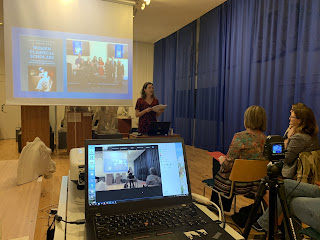 |
| With James Miller (whom I taught 20 years ago!) at Durham 6th-Form Centre |
I’ve come off social media for a few months after some bizarre reactions to the In Our Time radio show on Pericles to which I contributed, broadcast on September 17th. But some faithful friends, including the great Nat Haynes, have persuaded me at least to continue blogging, on the ground that women’s voices should not be silenced in public by hate campaigns. This all happened during my first in-person visit to schools and sixth-form colleges for several months to encourage them to expand their provision of classical subjects.
 |
| Some of the Year 13s at Newcastle RGS, where I talked Sappho & Ancient Women |
I managed to visit a few fine north-eastern institutions teaching classical civilisation, as well as my former postdoc Lucy Jackson (now lecturer in Greek at Durham Uni) and her beautiful new baby Zelda, beamingly reminiscent of Sappho’s poetic statements of her great love for her daughter Cleïs. But the north-east lockdown on September 17 prevented me, sadly, from my long-awaited visit to my friend, poet Tony Harrison, in his 80s and immuno-compromised. And now I find myself in quarantine for two whole weeks after Denmark was put on the list at 4 a.m. yesterday, when my return plane did not arrive until 4 pm. No leaving the house for any reason whatsoever!
 |
| Lecturing in Aarhus |
But it was worth it. It was pure joy to travel abroad again and to visit the lively Classics Department at Aarhus, where another former mentee, Prof. Isabelle Torrance, leads a large and inspirational ERC-funded project on Classical Influences in Irish Culture. Being able to address an audience physically, in person, and enjoy spontaneous laughter and questions that such a live event produces, was magical. And that evening we defiantly affirmed or forged friendships in the shadow of imminent separation.
 |
| Photo by my host, Archaeology Prof. Troels Myrup Kristensen |
I spoke on the history of women classical scholars in Denmark, a country of fewer than 6 million which has punched far above its weight in terms of classical scholarship relative to the size of its population. Birgitte Thott was one of the founders of Danish literary prose when she translated Seneca’s philosophical works in the mid-17th century. She also wrote a massive work on the importance of women being educated to an advanced level, which teems with classical references.
The visual familiarity of museum and gallery visitors all over Europe with ancient Greek art, particularly archaic sculpture, owes much to the sculptor Anna-Marie Carl-Nielsen, who was the first to align correctly the ‘Typhon’ pediment of the archaic Athenian temple of Athena, and painter Maria Henriques. Her watercolours of archaic statues, both Greek and Etruscan, once hung on the walls of every state school across Denmark.
Ada Adler, often said to be greatest woman philologist of all time, in the 1920s-1930s edited the massive Byzantine encyclopaedic Suda so brilliantly that her text is used by the latest online edition; Ingeborg Hammer-Jensen was a prolific expert on ancient Greek mathematics and science at a time when Danes were the world leaders in this area on account of the Archimedes palimpsest.
I was nervous about ‘taking coals to Newcastle’ by lecturing Danes on their own foremothers, but they either appreciated it or pretended to convincingly. And we were treated to a personal tour of the Aarhus museum of classical antiquities by its curator, Vinnie Nørskov. Since she is the top expert on the Classical Civilisation component in the Danish secondary curriculum which has been compulsory for over a century, I’ll be using quarantine to interview her and post it as a blog here soon.





No comments:
Post a Comment